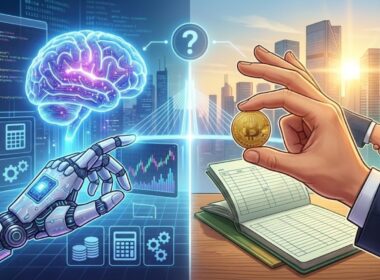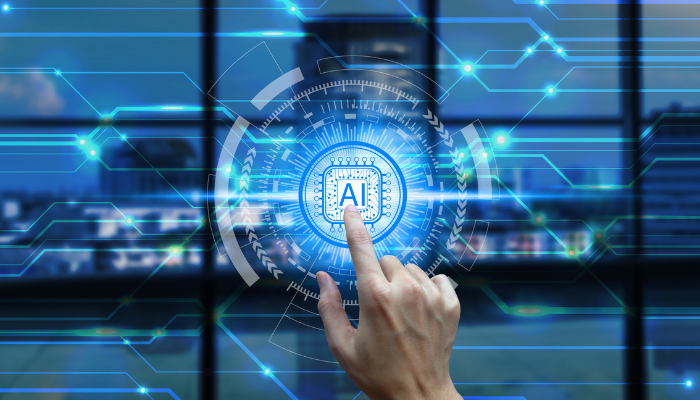“AI is the new electricity,” said Andrew Ng, co-founder of Google Brain.
And he’s not wrong. Just like electricity changed the way we live and work, AI is transforming how businesses operate across every industry.
Now, let’s be honest—AI probably sounds a little intimidating at first, right? Maybe you’re thinking, “I’m not running a tech giant—how could this really apply to me?” The truth is, AI is way more accessible than you think. It’s not some futuristic concept anymore. It’s already simploperations, cutting costs, and making businesses smarter, whether you’re managing a team, running a small business, or handling a growing startup.
Just like how everyone joked about DeepSeek taking over ChatGPT, businesses everywhere are starting to realize that AI isn’t just for techies anymore. It’s helping companies work smarter, faster, and more efficiently—whether you’re automating tasks, analyzing data, or even creating personalized customer experiences.
In this blog, we’re going to look at how AI applications are changing the game for businesses. keep reading!
Stats and Trends You Can’t Ignore
- AI is slowly taking over: Around 3.8% of U.S. businesses are already using AI, and the tech sector is leading the charge.
- Small businesses are catching on too: Guess what? Adoption shot up from 4.6% to 5.8% in just one year. So, yeah, you don’t need to be a Fortune 500 to play with AI.
- Who’s ahead? The Manufacturing and Information sectors are running with AI, with 12% adoption. They’re already reaping the rewards of AI-powered efficiency. (Census.gov)
- And it’s a global thing: Over in the UK, 51% of businesses are opting to invest in AI rather than hiring more staff. Looks like AI’s got the edge, huh?
Alright, So What’s the Takeaway Here?
AI isn’t some futuristic sci-fi fantasy—it’s already here, shaking things up. Businesses (big and small) are hopping on the AI train, and some are already miles ahead. So, the real question is: Are you still debating AI, or are you ready to make it work for you?
Maybe you’re thinking, “Sounds great, but how do I actually apply AI to my business?” That’s where things get interesting.
Let’s talk real-world applications of AI and how businesses like yours are using it to get ahead.
Applications of Artificial Intelligence in Business
Imagine having a super-smart assistant that can help you streamline operations, wow your customers, and spark innovation like never before. Sounds pretty amazing, right?
Well, that’s exactly what AI is doing for businesses today.
Let’s dive into 10 ways AI is shaking things up in the business world:
1. Automation of Routine Tasks
Let’s face it—repetitive tasks can be a huge drain on time and resources. From managing emails and data entry to handling simple customer queries, these tasks are necessary but can eat up hours that could be better spent on strategic work. This is where AI comes in to take the load off.
AI-driven automation tools are helping businesses tackle these repetitive tasks by automating routine processes. By using AI, businesses can reduce human error, speed up operations, and free up valuable time for employees to focus on higher-value work.
Key Benefits:
- Saves Time and Increases Productivity: AI quickly handles repetitive tasks like data entry, email filtering, and scheduling, which would otherwise take hours. This allows employees to focus on critical thinking, problem-solving, and creative work.
- Enhances Accuracy and Reduces Errors: Unlike humans, AI doesn’t get tired or distracted. It follows set rules and processes with precision, minimizing mistakes in tasks like financial calculations, reporting, and data management.
- Reduces Costs and Improves Efficiency: By automating routine work, businesses can save on labor costs while improving speed and efficiency. AI systems can handle high volumes of tasks without needing additional staff, making operations smoother and more cost-effective.
Examples:
- Email Management: Tools like SaneBox use AI to filter and organize emails, prioritizing important messages and categorizing the rest automatically.
- Customer Service: AI-powered chatbots (like Zendesk’s Answer Bot) handle common customer inquiries, reducing the need for human agents to handle every ticket.
- Document Management: AI-driven systems such as Kofax can automatically process documents, extract key data, and enter it into systems—saving hours of manual data entry.
Key Benefits:
- Builds Stronger Customer Loyalty: When businesses personalize experiences—like recommending relevant products or sending customized offers—customers feel valued and understood. This strengthens trust and encourages long-term relationships.
- Increases Sales and Conversions: Personalized marketing, such as showing customers products based on their past purchases, increases the likelihood of them making a purchase. When customers see offers that match their interests, they are more likely to buy.
- Enhances Customer Engagement: AI-driven personalization keeps customers interested by providing relevant content, product recommendations, and tailored support. A well-personalized experience makes users more likely to return and interact with the brand regularly.
Examples:
- Amazon’s Smart Recommendations: Amazon suggests products based on browsing history, past purchases, and customer preferences. This makes shopping easier and more relevant.
- Netflix’s Tailored Viewing Suggestions: Netflix uses AI to recommend TV shows and movies based on watch history, viewing habits, and ratings, ensuring users find content they enjoy.
- Spotify’s Personalized Playlists: Spotify’s AI creates custom playlists like “Discover Weekly” by analyzing listening patterns and preferences, keeping users engaged with new music they are likely to enjoy.
- E-commerce Stores with Personalized Discounts: Online stores use AI to offer discounts based on browsing behavior. For example, if a user frequently checks a product but hasn’t purchased it, the store might send a special discount to encourage the sale.
Key Benefits:
- Enables Smarter, Data-Driven Decisions: AI processes vast amounts of historical data to identify patterns and predict future outcomes. This allows businesses to make informed decisions instead of relying on guesswork, leading to better strategies and improved performance.
- Reduces Risks and Prevents Losses: Predictive analytics can spot potential risks before they escalate. Whether it’s detecting financial fraud, predicting equipment failures, or identifying market downturns, AI helps businesses take preventive action to avoid costly mistakes.
- Improves Demand Forecasting and Resource Planning: AI predicts future demand based on past trends, helping businesses optimize inventory levels, staffing, and production schedules. This reduces overstocking or shortages, improving efficiency and customer satisfaction.
Examples:
- Retail Demand Forecasting: Walmart uses AI-driven predictive analytics to anticipate which products will be in demand, helping manage inventory and avoid stockouts.
- Market Trend Predictions: IBM Watson analyzes financial and market data to predict trends, helping businesses adjust strategies before shifts happen.
- Fraud Detection in Banking: Banks like JPMorgan Chase use AI to analyze transaction patterns and detect fraudulent activity before it causes damage.
Exploring AI for your business? These future business ideas can inspire how AI can elevate your entrepreneurial journey.
4. AI in Cybersecurity
With the rise of digital transformation, cybersecurity is more critical than ever. Traditional methods of threat detection can’t keep up with the increasing complexity and speed of cyberattacks.
AI-driven cybersecurity tools constantly monitor networks, detect potential threats, and respond to them in real-time, ensuring businesses are protected 24/7. AI’s ability to learn from patterns and adapt means it’s better at spotting anomalies and suspicious activities than any manual system could be.
Key Benefits:
- Real-time Threat Detection and Prevention: AI continuously scans networks, looking for unusual activity and potential security threats. Unlike traditional security systems that rely on predefined rules, AI identifies patterns and anomalies in real time, stopping threats before they escalate.
- Reduces the Risk of Cyberattacks and Data Breaches: Cybercriminals constantly find new ways to bypass security measures. AI strengthens cybersecurity by analyzing vast amounts of data to detect hidden threats, helping businesses prevent costly breaches and data leaks.
- Adapts to New and Evolving Threats: Unlike traditional security tools that need constant updates, AI-powered systems learn from cyberattacks and evolve over time. This allows businesses to stay ahead of hackers and protect sensitive data against emerging threats.
- Automates Security Responses and Reduces Human Effort: AI-powered security tools can instantly respond to detected threats—blocking suspicious activity, isolating infected systems, and alerting security teams.
Examples:
- Darktrace’s AI-driven Threat Detection: Darktrace uses machine learning to monitor networks, detect anomalies, and prevent cyberattacks before they cause harm.
- CrowdStrike’s Endpoint Security: CrowdStrike’s AI-powered platform detects and stops malware, ransomware, and other cyber threats before they spread to other systems.
- Google’s AI-powered Phishing Protection: Google uses AI to scan billions of emails daily, blocking phishing attempts and protecting users from fraudulent messages.
5. AI for Customer Service and Chatbots
Imagine your customer service department handling hundreds of queries simultaneously without ever feeling overwhelmed. That’s what AI-powered chatbots do. These 24/7 assistants engage with customers, answer questions, and resolve issues without human intervention—freeing up your team for more complex tasks.
From answering frequently asked questions to guiding customers through troubleshooting steps, AI is making customer service more efficient and accessible than ever.
Key Benefits:
- 24/7 Customer Support Without Delays: AI chatbots are always available, meaning customers can get answers anytime—whether it’s late at night, on weekends, or during peak business hours. This ensures round-the-clock service without needing human agents to be online.
- Instant Responses, Faster Resolutions: Instead of making customers wait in long queues, AI chatbots instantly answer common questions, like tracking orders, refund policies, or troubleshooting issues. This improves customer satisfaction by reducing wait times.
- Cost-Effective and Scalable Support: Businesses don’t need to hire large customer service teams to handle routine queries. AI-powered chatbots take care of repetitive tasks, allowing human agents to focus on more complex issues. This reduces labor costs while improving efficiency.
- Consistent and Personalized Customer Interactions: AI chatbots use customer data to provide relevant responses based on past interactions. Whether it’s suggesting products, answering billing questions, or assisting with account issues, AI ensures every conversation is personalized and accurate.
Examples:
- Zendesk Answer Bot for Automated Support: Zendesk’s AI chatbot instantly answers common customer inquiries, reducing the need for human intervention and improving response times.
- Sephora’s AI Beauty Chatbot: Sephora uses AI-powered chatbots to recommend beauty products based on a customer’s skin type, preferences, and past purchases, creating a personalized shopping experience.
- Domino’s AI Chatbot for Order Tracking: Domino’s Pizza uses AI chatbots to help customers place orders, track deliveries, and get real-time updates, making the process smoother and more interactive.
6. AI in Sales and Lead Generation
AI doesn’t just help with closing sales—it helps with identifying leads that are most likely to convert. By analyzing customer data, AI can predict which prospects are high-value, allowing sales teams to focus on the most promising opportunities.
AI-powered tools also automate sales workflows, making it easier for businesses to manage their pipelines and close deals more efficiently.
Key Benefits:
- Identifies and Prioritizes the Best Leads: AI analyzes customer behavior, past interactions, and engagement levels to determine which leads are most likely to buy. This helps sales teams focus their time and energy on high-value prospects instead of chasing cold leads.
- Boosts Sales by Automating Routine Tasks: Sales teams spend hours on administrative tasks like updating CRM records, sending follow-up emails, and scheduling meetings. AI automates these tasks, allowing sales reps to focus on building relationships and closing deals.
- Speeds Up the Sales Process: AI-driven insights help sales teams make faster decisions. By predicting customer needs and recommending personalized pitches, AI shortens the sales cycle and increases conversion rates.
- Improves Forecasting and Decision-Making: AI can analyze past sales trends and market data to predict future revenue. Businesses can use these insights to adjust their strategies, set realistic targets, and improve overall sales performance.
Examples:
- HubSpot’s AI-Powered Lead Scoring: HubSpot’s AI analyzes customer interactions and assigns scores to leads based on their likelihood to convert, helping sales teams focus on the most promising prospects.
- Salesforce Einstein’s Smart Recommendations: Salesforce Einstein provides AI-driven insights on lead qualification, deal predictions, and next-best actions, making sales reps more efficient.
7. Inventory and Supply Chain Optimization
AI is revolutionizing inventory management and supply chains by predicting demand, tracking products, and optimizing delivery routes. With AI, businesses can balance supply and demand, ensuring they never overstock or run out of stock.
From logistics to demand forecasting, AI makes sure businesses can streamline their processes and reduce inefficiencies.
Key Benefits:
- Reduces Waste and Prevents Stock Issues: AI-powered inventory systems analyze sales trends and predict future demand. This helps businesses avoid overstocking (which leads to waste) and understocking (which results in lost sales). By maintaining the right stock levels, businesses can improve efficiency and reduce unnecessary costs.
- Optimizes Logistics and Delivery Routes: AI can track shipments in real-time and suggest the fastest, most cost-effective delivery routes. This ensures timely deliveries while reducing transportation costs and delays, benefiting both businesses and customers.
- Enhances Demand Forecasting for Smarter Planning: AI tools predict which products will be in high demand during specific periods, helping businesses prepare ahead of time. This is especially useful for seasonal sales, new product launches, and fluctuating market trends.
Examples:
- Walmart’s AI-Powered Demand Forecasting: Walmart uses AI to analyze sales data, weather patterns, and customer behavior to predict inventory needs, preventing both overstock and shortages.
- Amazon’s AI-Driven Warehouse Management: Amazon’s AI-powered system optimizes storage, predicts demand, and automates product sorting, enabling faster fulfillment and delivery.
8. AI for Marketing and Advertising
Marketing isn’t just about guessing what your customers want—it’s about using data to deliver the right message, at the right time, to the right person. AI helps businesses do just that by analyzing user behavior and automatically optimizing campaigns.
AI can also personalize marketing content, allowing businesses to target ads more effectively and increase conversions.
Key Benefits:
- Targeted Marketing: AI analyzes user behavior, search history, and online interactions to ensure ads are shown to people most likely to be interested in a product or service. This makes marketing efforts more effective by eliminating guesswork.
- Maximizes Return on Investment (ROI): AI optimizes ad placements, budgets, and bids in real-time, ensuring businesses get the most value from their marketing spend. By reducing wasted ad spending, AI-driven marketing strategies generate higher profits.
- Automates Campaign Optimization for Better Results: AI-powered marketing tools continuously test and adjust campaigns, refining ad copy, images, and targeting strategies to improve performance. This means businesses don’t have to manually tweak ads—AI does the work in real-time.
Examples:
- HireVue’s AI-Powered Video Interviews: HireVue uses AI to assess facial expressions, tone of voice, and word choices in video interviews, helping recruiters identify top candidates faster.
- Pymetrics’ AI-Based Candidate Assessment: Pymetrics uses neuroscience and AI to match candidates with job roles based on cognitive abilities and emotional intelligence, improving hiring accuracy.
10. AI for Financial Analysis
AI is changing how businesses approach financial analysis. By analyzing financial data, AI can detect fraud, predict market trends, and help with investment decisions. AI tools help businesses improve forecasting and make more accurate financial projections.
Key Benefits:
- Provides Real-Time Financial Insights: AI processes vast amounts of financial data instantly, giving businesses real-time updates on cash flow, expenses, and profitability. This allows companies to make quick, data-driven decisions instead of relying on outdated reports.
- Enhances Risk Management and Fraud Detection: AI-powered systems detect unusual patterns in financial transactions that may indicate fraud or security threats. Banks and financial institutions use AI to prevent fraudulent transactions before they occur, protecting both businesses and customers.
- Optimizes Investments and Market Predictions: AI analyzes historical data, market trends, and economic indicators to predict the best investment opportunities. This helps businesses and investors make smarter decisions about where to allocate their funds for maximum returns.
Examples:
- Betterment’s AI-Powered Investment Management: Betterment uses AI to manage investment portfolios, automatically adjusting allocations for better returns based on market conditions and user preferences.
- Kabbage’s AI-Based Loan Assessments: Kabbage uses AI to evaluate small business loans by analyzing financial history and market trends, helping lenders make accurate lending decisions.
- PayPal’s AI Fraud Detection System: PayPal employs AI to scan millions of transactions for suspicious activity, reducing fraudulent transactions and protecting user accounts.
AI is only getting smarter (hopefully not too smart, right?). But if you’re wondering what tools will be running the show in 2025, we’ve got the deets. Click here to check out the AI tools that’ll make you feel like you’re living in the future.
AI in Business Sounds Exciting, But Where Do You Start?
AI is everywhere—streamlining operations, predicting trends, and even making customer interactions smarter. But here’s the real challenge: How do you make AI work for your business?
Sure, AI tools sound great on paper, but implementing them the right way? That’s a whole different game. You need a partner who doesn’t just talk AI but builds solutions that actually drive results.
That’s where Codewave steps in. We don’t believe in one-size-fits-all AI. We craft solutions that fit your business like a glove, ensuring you get real impact—not just fancy tech.
Why Codewave?
- 10+ years of AI expertise across industries
- 400+ projects delivered—from smart automation to predictive analytics
- Awarded & recognized by Clutch, GoodFirms, TechBehemoth and ZeroDX
- Design Thinking approach—we put business goals first, tech second
- Trusted by startups & enterprises for scalable AI implementation
The future of AI isn’t just about automation—it’s about innovation. Let’s build it together!
Codewave is a UX first design thinking & digital transformation services company, designing & engineering innovative mobile apps, cloud, & edge solutions.






